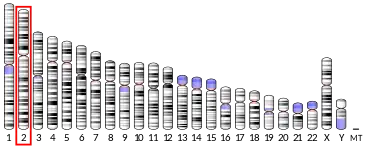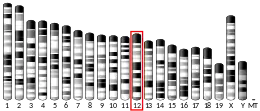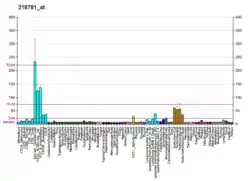SMC6
Structural maintenance of chromosomes protein 6 is a protein that in humans is encoded by the SMC6 gene.[5][6]
It is involved in the Alternative lengthening of telomeres cancer mechanism.[7]
Role in recombination and meiosis
Smc6 and Smc5 proteins form a heterodimeric ring-like structure and together with other non-SMC elements form the SMC-5/6 complex. In the worm Caenorhabditis elegans this complex interacts with the HIM-6(BLM) helicase to promote meiotic recombination intermediate processing and chromosome maturation.[8] The SMC-5/6 complex in mouse oocytes is essential for the formation of segregation competent bivalents during meiosis.[9] In the yeast Saccharomyces cerevisiae, SMC6 is necessary for resistance to DNA damage as well as for damage-induced interchromosomal and sister chromatid recombination.[10] In humans, a chromosome breakage syndrome characterized by severe lung disease in early childhood is associated with a mutation in a component of the SMC-5/6 complex.[11] Patient’s cells display chromosome rearrangements, micronuclei, sensitivity to DNA damage and defective homologous recombination.
References
- GRCh38: Ensembl release 89: ENSG00000163029 - Ensembl, May 2017
- GRCm38: Ensembl release 89: ENSMUSG00000020608 - Ensembl, May 2017
- "Human PubMed Reference:". National Center for Biotechnology Information, U.S. National Library of Medicine.
- "Mouse PubMed Reference:". National Center for Biotechnology Information, U.S. National Library of Medicine.
- Wiemann S, Weil B, Wellenreuther R, Gassenhuber J, Glassl S, Ansorge W, Bocher M, Blocker H, Bauersachs S, Blum H, Lauber J, Dusterhoft A, Beyer A, Kohrer K, Strack N, Mewes HW, Ottenwalder B, Obermaier B, Tampe J, Heubner D, Wambutt R, Korn B, Klein M, Poustka A (Mar 2001). "Toward a catalog of human genes and proteins: sequencing and analysis of 500 novel complete protein coding human cDNAs". Genome Res. 11 (3): 422–35. doi:10.1101/gr.GR1547R. PMC 311072. PMID 11230166.
- "Entrez Gene: SMC6 structural maintenance of chromosomes 6".
- Potts PR, Yu H (2007). "The SMC5/6 complex maintains telomere length in ALT cancer cells through SUMOylation of telomere-binding proteins". Nat. Struct. Mol. Biol. 14 (7): 581–90. doi:10.1038/nsmb1259. PMID 17589526. S2CID 7915836.
- Hong Y, Sonneville R, Agostinho A, Meier B, Wang B, Blow JJ, Gartner A (2016). "The SMC-5/6 Complex and the HIM-6 (BLM) Helicase Synergistically Promote Meiotic Recombination Intermediate Processing and Chromosome Maturation during Caenorhabditis elegans Meiosis". PLOS Genet. 12 (3): e1005872. doi:10.1371/journal.pgen.1005872. PMC 4807058. PMID 27010650.
- Hwang G, Sun F, O'Brien M, Eppig JJ, Handel MA, Jordan PW (2017). "SMC5/6 is required for the formation of segregation-competent bivalent chromosomes during meiosis I in mouse oocytes". Development. 144 (9): 1648–1660. doi:10.1242/dev.145607. PMC 5450844. PMID 28302748.
- Onoda F, Takeda M, Seki M, Maeda D, Tajima J, Ui A, Yagi H, Enomoto T (2004). "SMC6 is required for MMS-induced interchromosomal and sister chromatid recombinations in Saccharomyces cerevisiae". DNA Repair (Amst.). 3 (4): 429–39. doi:10.1016/j.dnarep.2003.12.007. PMID 15010319.
- van der Crabben SN, Hennus MP, McGregor GA, Ritter DI, Nagamani SC, Wells OS, Harakalova M, Chinn IK, Alt A, Vondrova L, Hochstenbach R, van Montfrans JM, Terheggen-Lagro SW, van Lieshout S, van Roosmalen MJ, Renkens I, Duran K, Nijman IJ, Kloosterman WP, Hennekam E, Orange JS, van Hasselt PM, Wheeler DA, Palecek JJ, Lehmann AR, Oliver AW, Pearl LH, Plon SE, Murray JM, van Haaften G (2016). "Destabilized SMC5/6 complex leads to chromosome breakage syndrome with severe lung disease". J. Clin. Invest. 126 (8): 2881–92. doi:10.1172/JCI82890. PMC 4966312. PMID 27427983.
Further reading
- Hartley JL, Temple GF, Brasch MA (2001). "DNA cloning using in vitro site-specific recombination". Genome Res. 10 (11): 1788–95. doi:10.1101/gr.143000. PMC 310948. PMID 11076863.
- Simpson JC, Wellenreuther R, Poustka A, et al. (2001). "Systematic subcellular localization of novel proteins identified by large-scale cDNA sequencing". EMBO Rep. 1 (3): 287–92. doi:10.1093/embo-reports/kvd058. PMC 1083732. PMID 11256614.
- Taylor EM, Moghraby JS, Lees JH, et al. (2001). "Characterization of a novel human SMC heterodimer homologous to the Schizosaccharomyces pombe Rad18/Spr18 complex". Mol. Biol. Cell. 12 (6): 1583–94. doi:10.1091/mbc.12.6.1583. PMC 37326. PMID 11408570.
- Strausberg RL, Feingold EA, Grouse LH, et al. (2003). "Generation and initial analysis of more than 15,000 full-length human and mouse cDNA sequences". Proc. Natl. Acad. Sci. U.S.A. 99 (26): 16899–903. doi:10.1073/pnas.242603899. PMC 139241. PMID 12477932.
- Ota T, Suzuki Y, Nishikawa T, et al. (2004). "Complete sequencing and characterization of 21,243 full-length human cDNAs". Nat. Genet. 36 (1): 40–5. doi:10.1038/ng1285. PMID 14702039.
- Gerhard DS, Wagner L, Feingold EA, et al. (2004). "The status, quality, and expansion of the NIH full-length cDNA project: the Mammalian Gene Collection (MGC)". Genome Res. 14 (10B): 2121–7. doi:10.1101/gr.2596504. PMC 528928. PMID 15489334.
- Wiemann S, Arlt D, Huber W, et al. (2004). "From ORFeome to biology: a functional genomics pipeline". Genome Res. 14 (10B): 2136–44. doi:10.1101/gr.2576704. PMC 528930. PMID 15489336.
- Hillier LW, Graves TA, Fulton RS, et al. (2005). "Generation and annotation of the DNA sequences of human chromosomes 2 and 4". Nature. 434 (7034): 724–31. doi:10.1038/nature03466. PMID 15815621.
- Potts PR, Yu H (2005). "Human MMS21/NSE2 is a SUMO ligase required for DNA repair". Mol. Cell. Biol. 25 (16): 7021–32. doi:10.1128/MCB.25.16.7021-7032.2005. PMC 1190242. PMID 16055714.
- Mehrle A, Rosenfelder H, Schupp I, et al. (2006). "The LIFEdb database in 2006". Nucleic Acids Res. 34 (Database issue): D415–8. doi:10.1093/nar/gkj139. PMC 1347501. PMID 16381901.
- Potts PR, Porteus MH, Yu H (2006). "Human SMC5/6 complex promotes sister chromatid homologous recombination by recruiting the SMC1/3 cohesin complex to double-strand breaks". EMBO J. 25 (14): 3377–88. doi:10.1038/sj.emboj.7601218. PMC 1523187. PMID 16810316.




